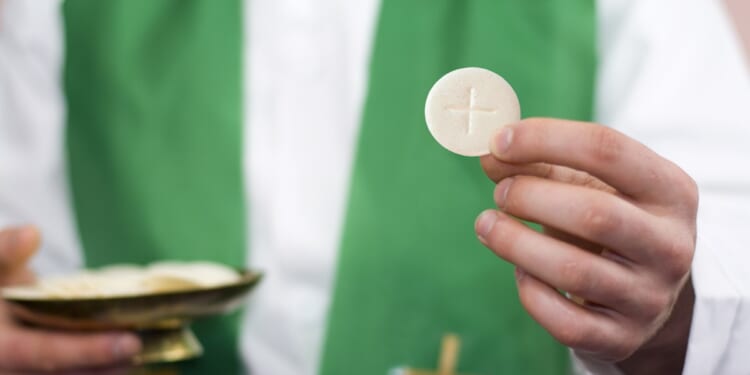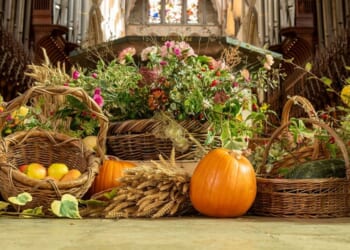CONGREGATIONALISM is being “silently endorsed” in the Church of England, a new report warns, because the leaders of new worshipping communities (NWCs) are writing eucharistic texts for their communities without the theological support of the wider Church.
The Communion Dilemma: The challenges of leading eucharistic New Things draws on a survey of 63 NWCs across 20 dioceses. It reports that 39 of them are using texts not authorised by the General Synod.
“The problem is not just [that] new things are breaking the rules, but they are seeking to exist outside of the ecology of the wider Church, in which all can be benefit and learn from one another,” the report says. One way forward would be to designate some New Things as “centres for liturgical experimentation”.
The report is by the Revd Dr Joshua Cockayne, director of the Bede Centre for Church Planting Theology at Cranmer Hall. The term “New Things” was used in an earlier report by the Centre, which found that dioceses had jettisoned the use of the word “church” in describing the various new worshipping communities being established in their parishes (News, 16 August 2024).
The new report describes a “radical shift” in the Church of England’s ecclesiology over the past 30 years, entailing what the former Archbishop of Canterbury Lord Williams described as a “careful loosening of the structures” to enable the growth of Fresh Expressions.
It criticises a failure to accompany this with “any serious reform of eucharistic practice”. Despite an expectation that Fresh Expressions would become sacramental, there was “no provision offered to help them engage with authorised liturgical texts, or advice about how they were to celebrate the sacraments”.
The report says that the “perennial criticism” that New Things are typically non-sacramental is not backed up by data. Only nine of the 63 gatherings surveyed never celebrated holy communion, while 74 per cent held a eucharist at least monthly or weekly (many gathering only once a month). Almost two-thirds of the respondents disagreed that the eucharist made worship less accessible.
Almost two-thirds (63 per cent) of those holding a eucharist used authorised forms of sevice — mostly Common Worship.
Fifty-one per cent, however, said that authorised liturgies were not suitable for their context, “noting in particular the difficulties of long, formal texts in informal contexts with low levels of education and literacy. . . On the whole, these respondents wanted to grow eucharistic communities and cared deeply about the place of sacraments in the mission of the Church but felt that the resources they had been provided with were insufficient for this purpose.”
Dr Cockayne writes: “Many of the services which are represented by these contexts will be very informal, drawing in different voices into community, and looking for opportunities to translate theological ideas into the vernacular. To stand up and read 700-words of formal liturgical prose in such a context is bound to feel ‘alien’.”
The report suggests that there are few consequences to the use of unauthorised liturgies. The fact that one respondent was unable to distinguish between an authorised liturgy and the “Celtic liturgies” being used in their setting “speaks to the level of liturgical literacy in the wider church”, it says.
One Fresh Expressions leader told a “confused” archdeacon that, when it came to the eucharistic prayers, “we write our prayers.” Another archdeacon told a community: “I need to tell you off once a year about your use of liturgy, then I won’t mention it again.”
It is a “common misconception”, Dr Cockayne writes, “that the Canons on liturgy permit clergy to create new services” in New Things contexts. “Unlike the provisions for a Service of the Word, the liturgies offered for Holy Communion lack the same degree of flexibility.”
Some refer to Canon B5, which mentions “occasions for which no provision is made”. But New Patterns for Worship, which was drafted by the Liturgical Commission, provides a work example that “flatly denies this interpretation”. It states: “Canon B5 cannot be stretched to cover services of Holy Communion even if they are for specific occasions, age groups, or places not specifically provided for.”
The main problem is not that clergy are violating the promises made in the Declaration of Assent, Dr Cockayne argues (“this is an issue for personal conscience and/or clergy discipline”); nor is the problem only that rules are being broken, although many would “benefit from engaging more seriously with the question of what it means for them to be Anglican”.
His chief concern is ecclesiological: “The current practice in the Church of England of unenforced and widely disregarded liturgical rules is that we are quickly becoming congregationalist in practice. . . In a context where the liturgical rules are stringent, but in which there are no real consequences for ignoring these rules, then inevitably, liturgy is determined locally and with no wider benefit for the church.”
The risk is twofold, he writes. “First, contexts do not benefit from the church’s wisdom and historic tradition; there is no theological corrective offered, and contexts risk liturgies with problematic or even heretical content.
“And, second, the wider church does not benefit from the lessons which have been learnt in this context about liturgy and celebration of the eucharist. There is no mechanism by which the particular act of worship in this community can feed back into the life of the church as a regional or national body. The Church of England is a fundamentally un-congregationalist church, and to continue operating in this way liturgically is deeply problematic.”
The report draws attention to a commitment in the Church’s Vision and Strategy document to starting 10,000 NWCs by 2030. If the “dilemma” set out is ignored, the report says, this may be a “flawed endeavour”.
Alongside a call for new liturgical resources, and the designation of some New Things as “centres for liturgical experimentation”, the report emphasises the need for “robust theological and liturgical training”. It warns: “Without the resources and structures to equip new contexts to engage sacramentally with communities, we are implicitly stating that sacraments are of no real relevance to the task of mission today.”
For information on a webinar discussing the study, to be held on 21 October, visit: cranmerhall.com

















